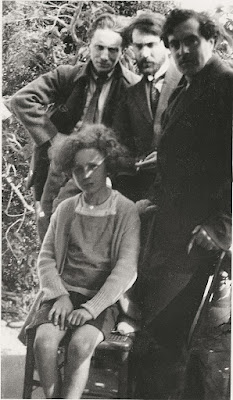SUDDENLY, LAST SUMMER (directed by Joseph L Mankiewicz)
SUDDENLY, LAST SUMMER (directed by Joseph L Mankiewicz)
In Freud The Secret Passion, John Huston’s direction is sometimes overly respectful, shying away from overt criticism of psychoanalysis, depicting Freud as a martyr, but there is enough engagement with its subject to make it consistently engaging. The black and white cinematography is crisp and decisively focussed. Montgomery Clift’s Freud is his most incisive performance. He had inhabited the role of psychiatrist before, in Tennessee William’s Suddenly, Last Summer, for instance. In this film he is Dr Cuprowicz, a psychiatrist and a surgeon performing lobotomies in a state hospital which also happens to be cash strapped. He is urged to perform a lobotomy on Catherine Holly, niece of wealthy widow Mrs Venables, performed by Katherine Hepburn. Mrs Venables has her own private reasons for wanting Catherine silenced, primarily because she had witnessed the death of her son Sebastian. Visual icons like the Martyrdom of Saint Sebastian and the statue of angelic death in the Venables tropical garden reinforce, albeit heavy handedly, themes of sado-masochistic torture, homosexuality, and degeneracy. Catherine, played by Elizabeth Taylor, is both Dr Cuprowicz’s patient and would-be lover, but there is no such theme of transference in The Secret Passion. Freud is engaged as a doctor, disavows the transference of erotic feelings onto him as a symptom and as a means of deflecting his wife’s jealousy. Freud begins to perceive the role of child sexuality in neurosis, his patient’s elicit hysterical symptoms such as a false pregnancy. These are symptoms of the erotic feelings that Frau Koertner feels for Dr Breuer. Breuer then transfers her to Freud’s care. She refers to Freud as ‘Freuer’, a conflation of both names. Frau Koertner, played by Susannah York in an early role, has developed neurotic symptoms in relation to her father’s death in a “hospital” in Naples. She stumbles over the word ‘Protestant, a ‘Protestant hospital’ where music is played. As Freud delves deeper into the scene where Frau Koertner is taken to the hospital to view her father’s corpse, he realises that the word ‘Protestant’ is a displacement of ‘prostitute’. In fact, Frau Koertner visited a brothel to identify her father’s corpse which still has lipstick smeared on its lips as he presumably died in coitus. Freud is beginning to discover parapraxis (or Freudian slip as we know it) and displacement, the tendency for the unconscious to yolk together diverse, seemingly disassociated elements. Freud anticipates a later discovery revealed in Dr Jacques Lacan’s seminal thesis “the unconscious is structured like a language”.
In Suddenly, Last
Summer a plausible romantic attachment between Clift and Taylor is posited
as Hepburn is revealed to be the nutcase, mistaking Dr Cuprowicz (meaning
“sugar” in Polish or “sugardaddy”) for her dead son Sebastian. The censor’s code was relaxed for this film
and Sebastian’s sexuality is divulged to underline the immoral dimensions of
his lifestyle, as some sort of warning, presumably. Sebastian is using his female companions,
firstly Mrs Venables and then Catherine Holly to attract local men. He is eventually murdered and cannibalised by
the young men he seeks at a ruined temple on the heights of a Spanish
village, Cabeza de Lobo. The name means ‘wolf’s
head’ in Spanish and refers indirectly to lobotomy. Clift’s Dr Cuprowicz is a dress rehearsal for
his role as Freud, but the latter is a more serious and focussed effort.
The central conceit of
Freud is Freud’s relationship with his father which is closely connected to
Freud’s ethnicity. Freud is unable to
conceive of why his father cannot react to anti-semitism but concludes that he
must be weak and human and not the god-like hero he took him to be. Freud experiences neurotic symptoms when he
approaches the Jewish cemetery where his father is interred.
Freud’s encounter with
Jean-Martin Charcot is pivotal in the film as Freud develops the technique of
hypnosis to encounter his patient’s unconscious. Charcot, known as the ‘Napoleon of the
neuroses’ left a debatable legacy, but it is Freud’s adoption of hypnosis which
allows him to begin to understand and treat neuroses. Eventually, he and Cecily Koertner abandon
hypnosis and explore the unconscious in terms of parapraxis, displacement, and
dreams.
Paul Murphy

Comments